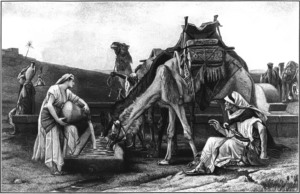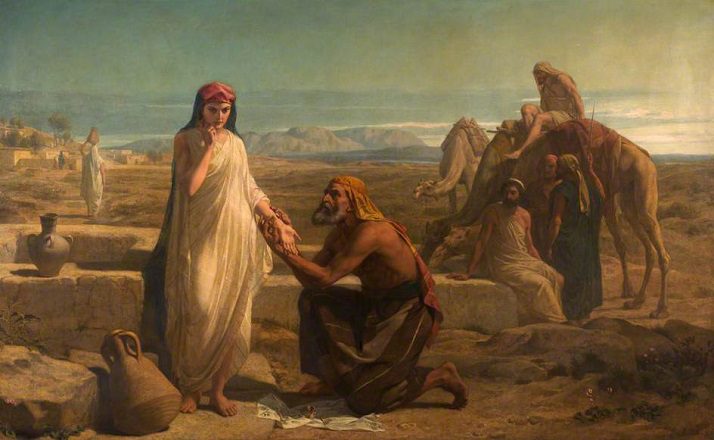From Genesis 22-24
 Abraham commands his servant to go out and find a wife for Isaac his son. The servant prays to the LORD for guidance and meets Rebekah. A lovely and considerate young lady. She agrees to the marriage and Isaac is comforted after his mothers death.
Abraham commands his servant to go out and find a wife for Isaac his son. The servant prays to the LORD for guidance and meets Rebekah. A lovely and considerate young lady. She agrees to the marriage and Isaac is comforted after his mothers death.
This post is part of my bible in a year series.
Passage and Comments
24 Now Abraham was old, well advanced in years. And the LORD had blessed Abraham in all things.
2 And Abraham said to his servant, the oldest of his household, who had charge of all that he had, “Put your hand under my thigh, 3 that I may make you swear by the LORD, the God of heaven and God of the earth, that you will not take a wife for my son from the daughters of the Canaanites, among whom I dwell, 4 but will go to my country and to my kindred, and take a wife for my son Isaac.” (Gen 24.1-4)
‘Abraham was old’. Abraham recognises he is old and will soon die. He is concerned for his son Isaac. So he commands one of his servants to take a wife for him.
‘Not from the Canaanites’. He does not want the servant to look for a wife among the Canaanites. These are the current inhabitants of the promised land (Gen 12.1) and under Noah’s curse (Gen 9.25). Rather he wants him to take one of his own kindred, his family.
5 The servant said to him, “Perhaps the woman may not be willing to follow me to this land. Must I then take your son back to the land from which you came?”
6 Abraham said to him, “See to it that you do not take my son back there. 7 The LORD, the God of heaven, who took me from my father’s house and from the land of my kindred, and who spoke to me and swore to me, ‘To your offspring I will give this land,’ he will send his angel before you, and you shall take a wife for my son from there.
8 But if the woman is not willing to follow you, then you will be free from this oath of mine; only you must not take my son back there.”
9 So the servant put his hand under the thigh of Abraham his master and swore to him concerning this matter. (Gen 24.5-9)
‘Must I take your son back?’. The servant is worried if he cannot find a woman willing then he would have to take Isaac back to the land Abram came from. This implies a failure of God’s promises. Abraham however refuses to accept God’s word will fail or do things which imply it.
Do your actions demonstrate faith in God’s promises?
‘Hand under thigh’. The servant takes the oath placing his hand under Abraham’s thigh, close to the genitals. Some scholars say on the genitals. This might make sense considering the oath concerned all Abraham’s offspring.
 The servant leaves for a city named Nahor. He prays to the LORD for guidance. The LORD answers his prayer. He finds a servant hearted girl named Rebekah. After a test to see if she is the girl the LORD intends he finds her father Laban and tells him of his mission and the LORD’s answer to his prayer. Laban agrees to the marriage and the servant pays the bride price. They return to Abraham’s camp.
The servant leaves for a city named Nahor. He prays to the LORD for guidance. The LORD answers his prayer. He finds a servant hearted girl named Rebekah. After a test to see if she is the girl the LORD intends he finds her father Laban and tells him of his mission and the LORD’s answer to his prayer. Laban agrees to the marriage and the servant pays the bride price. They return to Abraham’s camp.
62 Now Isaac had returned from Beer-lahai-roi and was dwelling in the Negeb.
63 And Isaac went out to meditate in the field toward evening. And he lifted up his eyes and saw, and behold, there were camels coming.
64 And Rebekah lifted up her eyes, and when she saw Isaac, she dismounted from the camel 65 and said to the servant, “Who is that man, walking in the field to meet us?” The servant said, “It is my master.” So she took her veil and covered herself.
66 And the servant told Isaac all the things that he had done. 67 Then Isaac brought her into the tent of Sarah his mother and took Rebekah, and she became his wife, and he loved her. So Isaac was comforted after his mother’s death. (Gen 24:62-67)
‘Brought her into the tent’. In God’s sovereign direction and control he provided for Isaac in his time of mourning. The providence of God at this time again shows he cares for his people and is continuing Abraham’s family line.
Story of Israel

There were three states of a marriage in the Bible:
Stage 1: signing the “ketubbah” contract (Creating the marriage bond-covenant)
- The bride would chose her husband and her father would sign a legal contract with him called a “ketubbah”.
- Once this is signed the couple is 100% married but do not have sex yet.
iii. Young children were often married, (arraigned marriage) but did not consummate until of age.
Stage 2: The “chuppah”: sexual consummation.
- Up to 7 years later, the groom is able to raise the money as set out in the ketubbah contract and notifies the father of the bride, who then sets a date to consummate the marriage at the bride’s home.
- The bride waits with her maidens, for the arrival of the groom and his companions.
iii. The couple enters the chuppah room and consummates the marriage while the companions of the bride and groom wait and celebrate outside or in the next room.
- The groom hands the bloodied “proof of virginity cloth” to the witnesses chosen by the bride’s parents, who then give it to the bride for safekeeping.
Stage 3: The wedding feast
- After consummation, the entire wedding party walks to the house of the groom in a procession for a wedding feast.
- At the conclusion of the wedding feast, the couple has completed the ancient ritual of marriage
Story of Jesus
Today’s passage shows God’ role in bringing the marriage about. Abraham’s family was still quite small and their survival hung by a thread. In the gospel, we see God’s long term faithfulness to his promise of offspring.
41 And when Elizabeth heard the greeting of Mary, the baby leaped in her womb. And Elizabeth was filled with the Holy Spirit, 42 and she exclaimed with a loud cry, “Blessed are you among women, and blessed is the fruit of your womb! 43 And why is this granted to me that the mother of my Lord should come to me? 44 For behold, when the sound of your greeting came to my ears, the baby in my womb leaped for joy. 45 And blessed is she who believed that there would be a fulfillment of what was spoken to her from the Lord.” (Lk 1.41-45)
Copyright © Joshua Washington and thescripturesays, 2014. All Rights Reserved.

